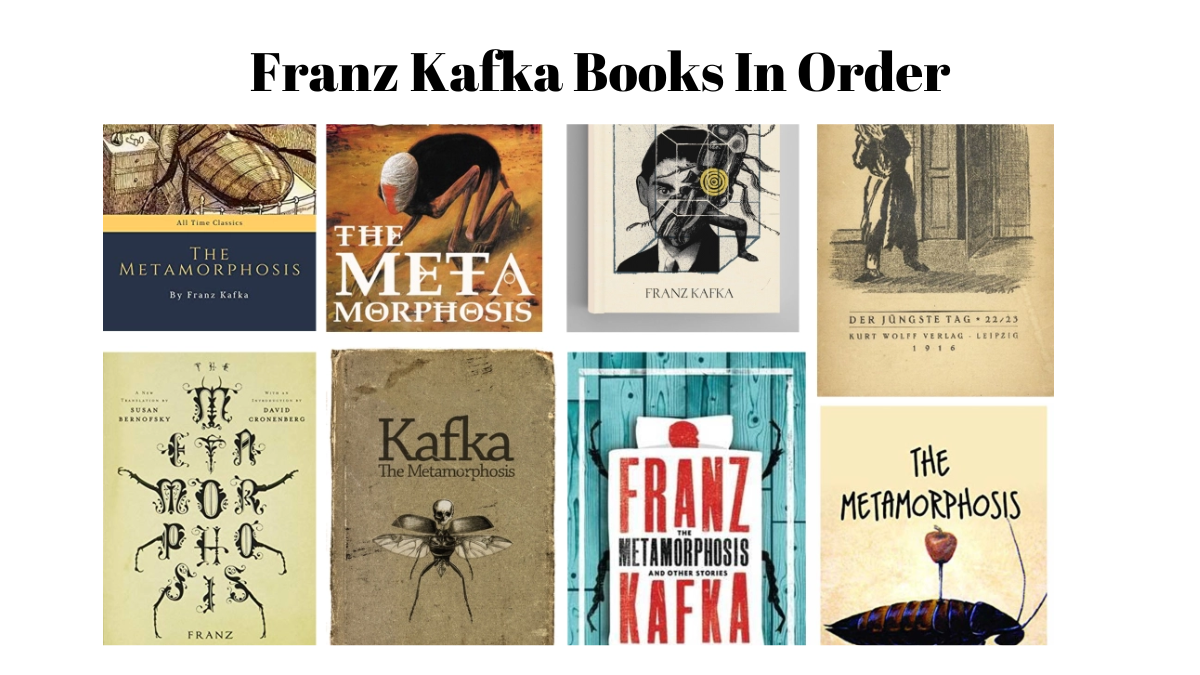Franz Kafka, a renowned German-speaking Bohemian-Jewish novelist and short story writer, is widely regarded as one of the major figures of 20th-century literature. Born in 1883 in Prague, where he spent most of his life, Kafka’s writing is characterized by its unique mixture of psychological insight, philosophical depth, and literary innovation.
In this article, we will talk about Franz Kafka books, examining his life, works, and lasting impact on literature.
Contents
The Metamorphosis
“The Metamorphosis” is a novella by Franz Kafka, first published in 1915. It is one of Kafka books and most famous works and explores themes of alienation, identity, and the absurdity of life:
The story begins with Gregor Samsa, a travelling salesman, waking up to find himself transformed into a giant insect. Despite this shocking change, the narrative proceeds with a matter-of-fact tone, emphasizing the absurdity and lack of justice in the universe.
Gregor’s transformation is symbolic of the alienation he felt even before the metamorphosis. He was already distant from his job, his boss, and even his family, whom he supported financially without much emotional connection.
As Gregor struggles to adapt to his new form, his family’s reaction ranges from horror to acceptance. His sister, Grete, initially takes care of him, but as the family’s financial situation worsens without Gregor’s income, they grow resentful and neglectful of him.
Another key theme is the idea of identity and self-worth being tied to one’s ability to work and provide. Gregor’s value to his family is directly connected to his job, and once he can no longer work, he becomes a burden to them.
The novella also explores the transformative power of alienation. While Gregor’s change is degrading, it ironically leads to his family becoming more independent and assertive. They are forced to find work and take on responsibilities that Gregor had previously shouldered alone.
The Trial
“The Trial” is another of Franz Kafka’s masterpieces, written between 1914 and 1915 and published posthumously in 1925. It is a complex novel that delves into themes of bureaucracy, the seemingly arbitrary nature of justice, and the struggle of an individual against an impersonal system. Here is a detailed explanation:
The novel follows the story of Josef K., a respectable bank officer who is unexpectedly arrested by two unidentified agents from an unspecified agency for an unspecified crime. The arrest is bizarre, as Josef K. is neither taken into custody nor informed of what he is accused of.
Throughout the novel, Josef K. encounters a series of bizarre and frustrating bureaucratic hurdles as he tries to navigate the opaque and labyrinthine legal system to clear his name. He meets various characters, including lawyers, court officials, and other defendants, who are all part of the enigmatic judicial system.
One of the central themes of “The Trial” is the incomprehensible and impersonal nature of bureaucracy and the legal system. Josef K.’s experiences highlight the helplessness of the individual in the face of a convoluted and indifferent system that operates without transparency or accountability.
The Castle
It is a novel by Franz Kafka, published posthumously in 1926. The story revolves around the protagonist, K., who arrives in a small, remote village in Central Europe, seeking to gain access to the mysterious Castle, which is the seat of power and authority in the region. The Castle is a symbol of bureaucratic authority, and K.’s quest is to gain permission to live and work in the village, which is controlled by the Castle’s officials.
The novel explores themes of alienation, absurdity, and the struggle against bureaucratic authority. K. is a solitary figure who is disconnected from the villagers and the Castle’s officials. He is a stranger in a strange land, and his attempts to communicate with the Castle’s officials are met with indifference and confusion.
Throughout the novel, K. faces numerous obstacles and setbacks as he tries to gain access to the Castle. He encounters various characters, including the Castle’s officials, who are often incomprehensible and uncooperative. The novel’s tone is somber and bleak, reflecting the sense of despair and hopelessness that pervades K.’s journey.
Amerika
It is an unfinished novel by Franz Kafka, written between 1912 and 1914 and prepared for publication by Max Brod in 1927, three years after the author’s death. The manuscript was entitled Der Verschollene (“The Lost One”). Kafka published the first chapter separately under the title Der Heizer (“The Stoker”) in 1913.
The book is a longer version of Kafka’s short story “The Stoker” and was written at the same time as his other famous stories, “The Metamorphosis” and “The Trial”. It tells the story of Karl Rossmann, an immigrant, and shows a funny but critical picture of America in the early 1900s.
The story is about young Karl Rossmann who comes to America and tries to fit into a confusing and unfriendly place. The story of how he was kicked out of his home in Prague after a problem with the family cook shows Kafka’s unique way of twisting memories.
The parts where Karl travels to America and meets a sad worker on the ship are also done in a special way. The book talks about feeling out of place, lost, and trying to figure out who you are in a new country. Through what happens to Karl, Kafka questions the capitalist way and how it can make society less human.
The Complete Novels of Kafka
The Complete Novels of Kafka is a collection of three novels written by Franz Kafka, a renowned Austrian writer. The novels included in this collection are The Trial, Amerika, and The Castle. These novels are considered some of Kafka’s most important works, showcasing his unique writing style and exploring themes of alienation, existentialism, and the human condition.
The Trial is a novel that tells the story of Joseph K., a bank employee who is suddenly arrested and put on trial without knowing the charges against him. The novel explores the themes of bureaucracy, morality, and the search for meaning in a seemingly meaningless world. Through Joseph K.’s journey, Kafka critiques the dehumanizing effects of modern society and the arbitrary nature of authority.
Amerika is a novel that follows the story of Karl Rossmann, a young man who is sent to America after getting a young woman pregnant out of wedlock. The novel explores themes of identity, belonging, and the American Dream. Through Karl’s experiences, Kafka critiques the idea of the American Dream and the notion of a perfect society.
The Castle is a novel that tells the story of K., a protagonist who is trying to gain access to the mysterious Castle, which is the seat of power in a small town. The novel explores themes of power, authority, and the search for meaning. Through K.’s journey, Kafka critiques the arbitrary nature of power and the ways in which individuals are often powerless against the forces of authority.
Some Questions
Who was Franz Kafka?
Franz Kafka was a Prague-born German writer of Jewish descent, widely regarded as one of the major figures of 20th-century literature.
What kind of books did Franz Kafka write?
Franz Kafka wrote novels and short stories that often explored themes of alienation, anxiety, and the human condition.
What is his most famous work?
A Hunger Artist is one of Kafka’s most famous collections of short stories, which he prepared for publication before his death.
Read More:
- The Real Reason Invoices Go Unpaid — And How Collection Automation Can Fix It
- Best Places to Buy Diamonds and Engagement Rings Online
- Building Focus and Strategy Through Interactive Digital Experiences
- How Students’ Reading Interests Influence Their Motivation and Performance in Writing Assignments
- The Damages Resulting from the Use of Suboxone

Chandler is an avid automobile enthusiast who is passionate about all things on wheels. From the latest car models to classic vintage rides, I love exploring the automotive world’s intricate details and engineering marvels. With years of experience in test-driving, reviewing, and analyzing cars, I provide readers with comprehensive insights and honest opinions.



























